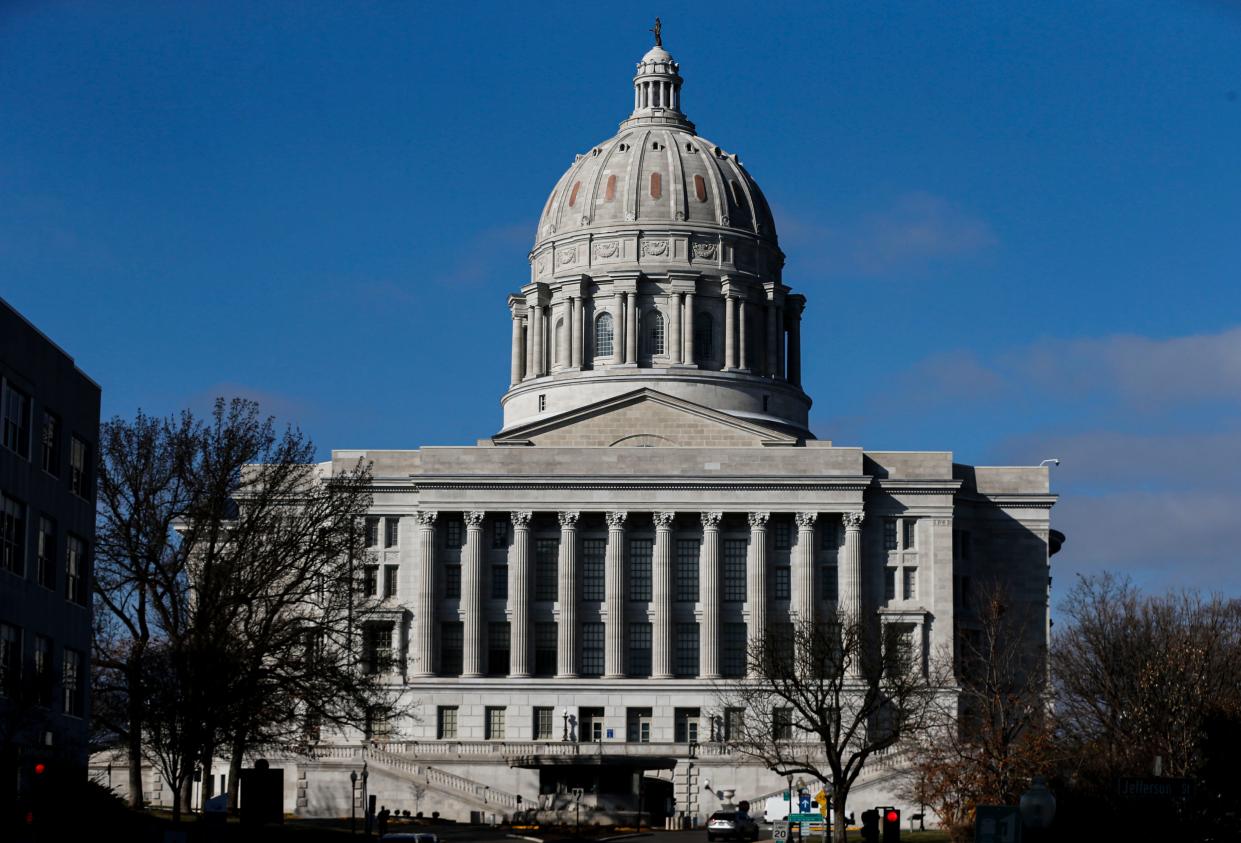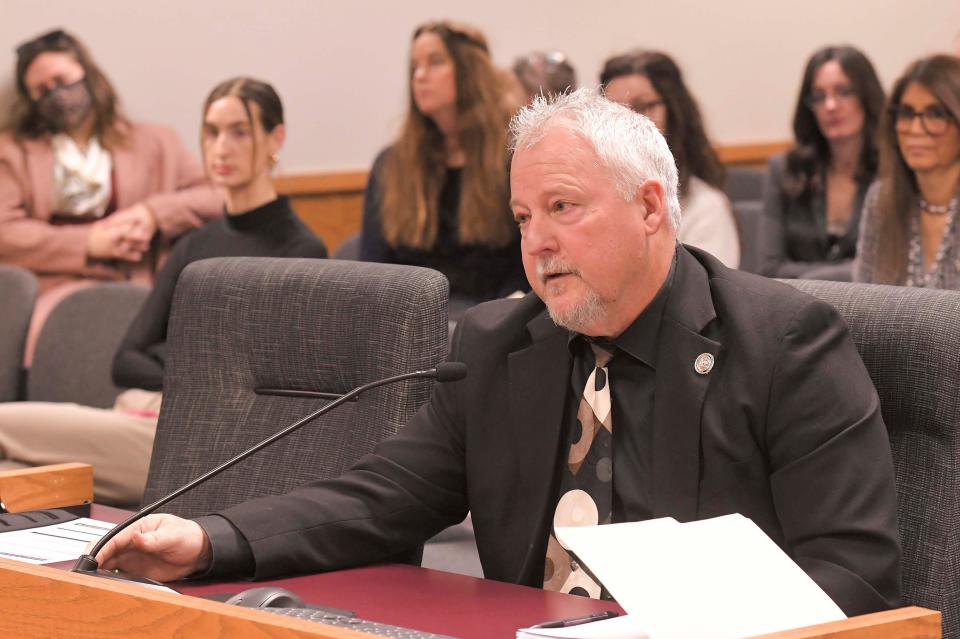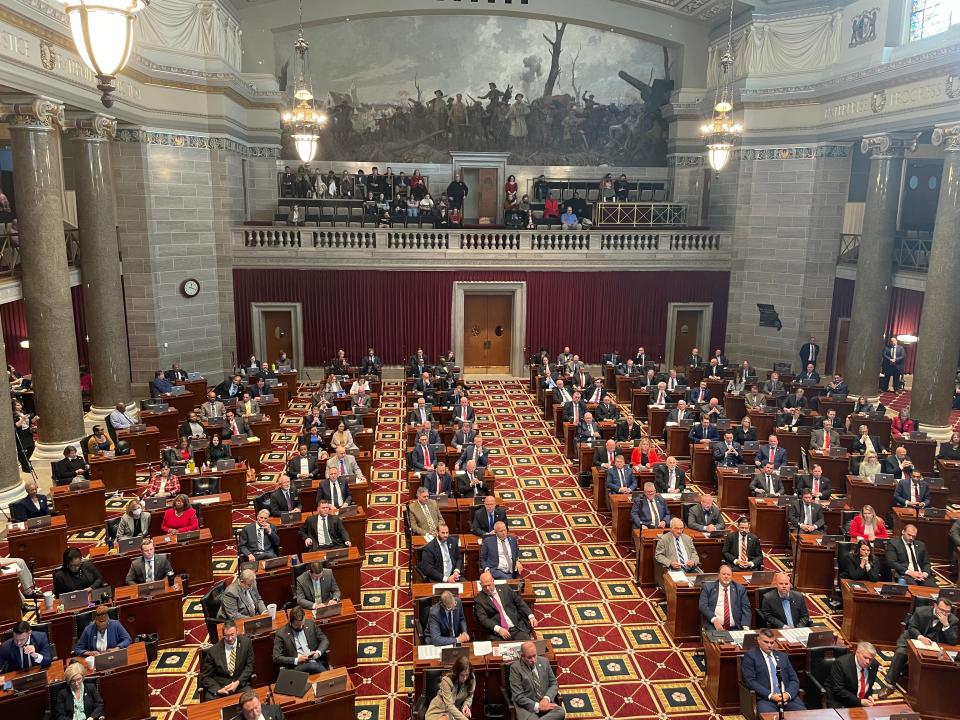Open enrollment in Missouri public schools takes center stage in House education committee

The perennial "open enrollment" bill took center stage Wednesday as the first proposal presented in 2024 to the House Committee on Elementary and Secondary Education.
This is the fourth year that state Rep. Brad Pollitt, a Republican from Sedalia, has pitched the policy change.
"This is the fourth year that I have brought this bill to the House of Representatives. It's passed out of the House the last three times and it's always been a close vote," he said in opening remarks. "There are a number of very pro -public education representatives that support this legislation."
Pollitt, a retired teacher and administrator with 34 years experience, argued — as he has in years past — that a child's address should not dictate which public school they attend.
If House Bill 1989 is approved, students will have the ability to transfer to a different district than where they are assigned and part of the money earmarked for their education will go to the new district. Districts use a mix of local tax revenue and state and federal funding to educate students.
"Local taxes stay local," he said of property taxes generated within a district. "State money follows the student."

Calling himself a "strong supporter of public schools," he said families ought to be able to decide which school is the best fit for their child.
"I believe that open enrollment is a step in the right direction in educational reform to offer choice and accountability within the public school system," he told the committee. "This is an opt-in bill where the decision is left in the hands of the local district if they want to opt in and receive students and they determine what grades they will take those students and in what programs."
The proposal includes a 3% cap on the number of students who can transfer out of most districts.
Under the plan, districts willing to accept students will notify the state by Dec. 1. Families must apply for a transfer by Feb. 1 and decisions will be made by April 1.
The bill includes a request for $80 million to help provide transportation for students who qualify for free or reduced price schools meals or who qualify for special education services.
"This bill allows the 899,000 students in the state of Missouri in the public school system the opportunity to have a choice within the very system that their parents pay taxes to," Pollitt said.
He gave the committee a preview of some of the concerns that will likely be raised.
"You'll hear things that this forces competition among school districts. I'm totally in favor of competing with our programs, with our sports," he said. "There's nothing in this bill that requires a school district to consolidate."
According to a 2022 report by the Education Commission of the States, at least 43 states have voluntary policies permitting inter-district open enrollment and 19 states require some level of open enrollment.
Access for special education students in question
State Rep. Kathy Steinhoff, a Democrat from Columbia, said she is highly skeptical that open enrollment will help the state's public education system.
"I appreciate the fact that this bill puts a lot of safeguards in place. It's very well thought out. It really considers so many things that make me fearful of an open enrollment bill that would be like the Wild Wild West," she said. "I can tell that you've really considered unintended consequences, but the idea of unintended consequences are the ones we haven't thought of."
Steinhoff and others asked how meeting the needs of students who qualify for special education services will be handled as part of the proposal. "You don't want a bill that ends up being challenged in court and then the bill falls apart."
Pollitt said under open enrollment, districts that accept transfers will not be required to add programs or teachers.
Steinhoff said she sees "merit to being able to give families some choices" but questioned if students with special needs or a history of discipline issues will be able to participate at the same level.
"It doesn't sound like it is allowing all Missouri students to have a choice, like certain special education students and certain students that have discipline records probably would not have the same opportunities," she said.
Representatives from the American Federation for Children and the Quality Schools Coalition told the committee they support the bill.
Teachers unions, school leaders question impact of proposal
Matt Michelson, director of education policy for the Missouri State Teachers Association, said the group opposes the bill. "Our members are deeply concerned about the prospects of consolidation that could happen under this bill, also increasing student mobility and the detrimental effects of student mobility."
He said open enrollment will increase the workload of administrators but noted the bigger issue was an existing issue of recruiting and retaining enough teachers.
Michelson said transportation funds requested in the open enrollment bill could be better spent elsewhere. "We know $80 million could go a really long way at addressing some of the low salaries we have across the state, and hopefully keep keeping high quality teachers in the classroom."
Mike Lodewegen, an advocate with the Missouri Council of School Administrators, said the group opposes the bill.
He argued districts that lose students due to open enrollment may have to cut staff and programs, which could hurt the students who remain in districts where they are assigned.
"Students leave for whatever reason, they may be performance-related, it may be familial-related, it may be ideological in nature. Those students leave and that money also follows that student," he said. "The students that are left are then forced to have to deal with the school that is left."
Michelson said the biggest impact may be on small districts "on the bubble." He pointed to the Halfway district, which is between Buffalo and Bolivar in Polk County.
He said with limited jobs in Halfway, parents who live in Halfway may be tempted to enroll students in the cities where they are employed. "What is the threshold that that community and that school is going to meet to say 'We no longer need a school, we no longer can have a school' and what does that mean for our rural communities?"

Otto Fajen, legislative director for the Missouri National Education Association, said the proper level of oversight is needed for open enrollment to work as intended.
"The tendency if you don't have the right guidelines for implementing it or monitoring it, for making sure that you're evaluating its impact, the tendency is for it to segregate and also to not have equitable opportunity for all students," Fajen said.
He said to win the support of MNEA, safeguards against "re-segregation" must be in place along with wording that ensures equitable access for students eligible for special education services.
"Those are two areas that still need work," he said.
More: Facing opposition, MO school board will not adopt social-emotional learning standards
Lisa Pannett, a lobbyist for ArmorVine, expressed concern that some of the requirements and procedures for how open enrollment would work in Missouri would be left to the state Department of Elementary and Secondary Education.
Pannett said ArmorVine, which promotes Christian principles of freedom and liberty, is worried the framework put in place could include diversity, equity, and inclusion efforts.
"As conservatives, we should be concerned when we leave these things open to DESE. DESE has been a problem for us. They're the ones bringing in the woke agenda," she told the committee. "And when we allow DESE to come in and set these kinds of standards and guidelines, it's a problem."
Claudette Riley covers education for the News-Leader. Email tips and story ideas to criley@news-leader.com.
This article originally appeared on Springfield News-Leader: Missouri House panel hears bill for open enrollment in public schools

